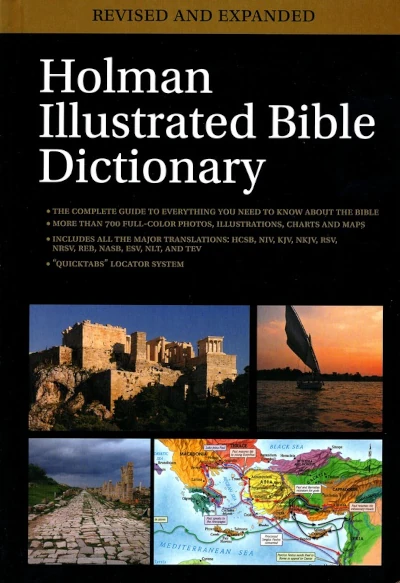The Purpose of Biblical Meditation
Have you ever wondered how to quiet the noise of life and truly hear God’s voice? Biblical meditation offers a profound way to do just that. Unlike worldly practices that emphasize emptying the mind, biblical meditation fills our hearts and minds with God’s Word, aligning our thoughts with His truths.
Meditation, in its simplest form, means focused reflection. In the Bible, it holds a deeper purpose: drawing closer to God through intentional engagement with His Word. When we meditate on Scripture, we pause to reflect on His promises, wisdom, and love. As Joshua 1:8 says, “Keep this Book of the Law always on your lips; meditate on it day and night.”

Holman Illustrated Bible Dictionary Hardcover
This comprehensive dictionary, featuring over 6,500 articles from Aaron to Zuzite, is designed to help readers better understand and interpret the Scriptures. The content is enhanced by some 700 full-color photos, maps, and charts, making it an invaluable resource for personal study. Get Yours on AmazonBiblical meditation is more than a spiritual discipline—it’s a life-changing practice. It deepens our faith, renews our minds, and provides peace in the midst of chaos. By meditating on God’s Word, we invite Him to transform our hearts and guide us through life’s challenges.
In this guide, we’ll explore how biblical meditation can inspire, guide, and enrich your relationship with the Lord. Let’s embark on this journey together, discovering techniques to deepen our faith and experience the joy of God’s presence.
What is Biblical Meditation?
Biblical meditation is a unique and purposeful practice that sets itself apart from other forms of meditation. While many meditation practices focus on emptying the mind to achieve inner peace or detachment, biblical meditation emphasizes filling the mind with God’s Word. It involves reflecting deeply on Scripture, allowing it to guide our thoughts and transform our lives.
Psalm 1:2 describes the blessed person as one whose “delight is in the law of the Lord, and who meditates on his law day and night.” This meditation is not passive; it’s active engagement with God’s truth. Similarly, Joshua 1:8 encourages us to “meditate on it [the Book of the Law] day and night, so that you may be careful to do everything written in it.” The goal is clear: to align our hearts and minds with God’s will.
Unlike secular meditation, which often focuses on self-awareness or detachment, biblical meditation draws us closer to God. It renews the mind by replacing worldly patterns of thinking with godly wisdom (Romans 12:2). As we meditate on Scripture, the Holy Spirit uses these truths to transform our hearts, making us more Christlike in thought and action.
Biblical meditation not only strengthens our faith but also brings peace, wisdom, and clarity. It shifts our focus from fleeting distractions to eternal truths, equipping us to navigate life’s challenges with confidence in God’s promises. Through this practice, we learn to delight in God’s Word, finding hope and strength in His presence. Biblical meditation is more than a spiritual discipline, it’s a way to deepen our relationship with the Lord and live out His Word.
Preparing for Biblical Meditation
Preparation is essential for meaningful biblical meditation. By creating the right environment and approach, we set the stage to engage deeply with God’s Word.
First, choose a quiet place where distractions are minimal. Biblical meditation requires focus, and a peaceful environment helps eliminate the noise and interruptions that can pull our attention away from Scripture. This could be a cozy corner at home, a spot in nature, or even a quiet room in your church.
Next, set a specific time for meditation. Consistency is key to making biblical meditation a regular practice. Whether it’s early in the morning, during a lunch break, or in the evening, dedicating a set time allows you to prioritize your spiritual growth. As Psalm 1:2 reminds us, meditating on God’s law “day and night” fosters a rhythm that keeps us connected to His Word.
Selecting a passage of Scripture is another crucial step. For beginners, starting with shorter, meaningful passages, such as verses from Psalms or Proverbs, can be helpful. These books are rich with wisdom and encouragement, making them ideal for reflection. The focus should be on quality, not quantity, choose a verse or two that speaks to your heart.
Finally, pray for guidance before you begin. Inviting the Holy Spirit to open your heart and mind ensures that your meditation is Spirit-led. Ask for understanding, insight, and the ability to apply the truths of Scripture to your daily life. As you meditate, let your prayer be a dialogue with God, inviting Him to transform your thoughts and reveal His will.
By preparing thoughtfully, you create the space and mindset needed for biblical meditation to bring lasting spiritual growth and a closer connection to the Lord.
Practical Techniques for Biblical Meditation
Engaging in biblical meditation requires practical techniques to focus our minds and hearts on God’s Word. These steps provide a structured way to deepen your connection with Scripture and enrich your spiritual life.
Read Slowly
Biblical meditation begins with slowing down. Read the chosen passage deliberately, focusing on each word and its meaning. Avoid rushing through the text; instead, let the words sink in and resonate. Consider the tone, context, and purpose behind the Scripture. For example, if you’re meditating on Psalm 23, pause to reflect on the phrase “The Lord is my shepherd.” What does it mean for God to shepherd you personally? Reading slowly helps you uncover layers of meaning and invites God to speak through His Word.
Reflect and Visualize
After reading, take time to reflect and visualize the passage. Picture the scene, the people, or the emotions described. This step immerses you in the Scripture, making it more vivid and personal. For instance, when meditating on Jesus calming the storm (Mark 4:35–41), imagine the waves, the disciples’ fear, and Christ’s commanding voice. Visualization enhances your understanding and brings Scripture to life in your mind.
Pray Through the Passage
Turn the words of Scripture into personal prayers. As you meditate, respond to the text by speaking directly to God. If you’re reading Philippians 4:6–7, you might pray, “Lord, help me not to be anxious but to trust in You fully.” Praying through the passage transforms biblical meditation into an active conversation with God, deepening your relationship with Him.
Journal Insights
Journaling is a powerful way to capture the truths and revelations you encounter during biblical meditation. Write down your thoughts, feelings, and applications. What is God revealing to you through this passage? How can it shape your actions or attitudes? Journaling creates a record of your spiritual growth and serves as a reference for future meditation.
Repeat Key Phrases
Repetition is a foundational technique for internalizing Scripture. Select a key phrase or verse from your meditation and repeat it aloud or silently. For example, if you’re focusing on Isaiah 41:10, repeat, “Do not fear, for I am with you.” Repetition reinforces the message, allowing it to settle deeply in your heart and mind. Over time, these truths become a source of encouragement and strength.
Memorization
Memorizing Scripture takes biblical meditation to another level. Committing verses to memory allows you to meditate anytime, anywhere. Start with shorter, impactful verses and gradually work toward longer passages. Memorization not only aids reflection but also equips you with God’s Word for moments of need. As Psalm 119:11 says, “I have hidden your word in my heart that I might not sin against you.”
By integrating these practical techniques into your routine, biblical meditation becomes a transformative practice. It enables you to focus on God’s truth, internalize His promises, and live out His Word in your daily life. As you meditate, you’ll experience renewed faith, a strengthened relationship with the Lord, and the peace that comes from dwelling in His presence.
Applying Biblical Meditation to Daily Life
Biblical meditation isn’t limited to quiet moments; it can be woven into the fabric of our daily lives. By incorporating meditation into routines, we create opportunities to reflect on God’s Word throughout the day.
Meditate During Daily Activities
You don’t need to set aside large blocks of time to engage in biblical meditation. Instead, integrate it into your everyday tasks. While commuting, cooking, or walking, focus your thoughts on a specific verse or biblical truth. For instance, as you fold laundry, reflect on Colossians 3:23: “Whatever you do, work at it with all your heart, as working for the Lord.” Let Scripture guide your thoughts and attitudes during even the most routine activities.
Use Devotional Tools
Consistency is vital for biblical meditation, and devotional tools can help. Use Bible apps with daily verse reminders, guided devotions, or audio Bibles to keep Scripture at the forefront of your mind. Journals are another powerful tool; jotting down your reflections and prayers keeps you engaged with the Word. These tools provide structure and encourage you to make meditation a regular habit.
Share Your Insights
Discussing your biblical meditation with others deepens understanding and creates a sense of accountability. Share what God has revealed to you with a friend, family member, or small group. This practice not only strengthens your faith but also encourages others to engage with Scripture. For example, if a verse like Proverbs 3:5–6 has impacted you, sharing how you’re applying it can inspire others to trust in the Lord.
Practice Gratitude
Biblical meditation is a perfect opportunity to reflect on God’s goodness. As you meditate, focus on His blessings, promises, and faithfulness. Let passages like Psalm 100:4—“Enter his gates with thanksgiving and his courts with praise”—guide your gratitude. Gratitude shifts your perspective and aligns your heart with God’s purposes, fostering joy and peace in your daily life.
By integrating biblical meditation into your routines, using helpful tools, sharing insights, and practicing gratitude, you can experience its transformative power every day. These small steps help you stay connected to God’s Word and deepen your relationship with Him, no matter how busy life becomes.
Overcoming Common Challenges
Practicing biblical meditation can feel challenging, especially when distractions or a busy schedule get in the way. Wandering thoughts are a common struggle, but they don’t have to derail your efforts. When your mind drifts, gently bring your focus back to the Scripture. A helpful strategy is to focus on a single word or phrase from the passage, repeating it until your thoughts are centered again.
Another challenge is finding time for biblical meditation amid life’s demands. Start small—just five minutes a day can make a difference. Gradually increase the time as you grow more comfortable. Consider pairing meditation with an existing habit, like your morning coffee or evening wind-down, to create consistency.
Patience is key. Biblical meditation is a discipline that develops over time. Don’t be discouraged if it feels unnatural at first. Trust that God will honor your efforts to draw closer to Him. Rely on His strength through prayer, asking the Holy Spirit to guide and sustain you.
With persistence and God’s help, these challenges can become opportunities to grow in faith. Biblical meditation isn’t about perfection; it’s about faithfully seeking God and letting His Word shape your heart and mind.
Closing Thoughts on Biblical Meditation
Biblical meditation is a practice that draws us closer to God and fills our lives with His truth. By meditating on His Word, we align our hearts and minds with His will, experiencing peace, renewal, and spiritual growth. This sacred discipline allows us to reflect deeply on Scripture, turning knowledge into faith and faith into action.
Commit to making biblical meditation a regular part of your life. Whether it’s a few moments each day or longer periods of reflection, the time spent focusing on God’s Word will enrich your faith and equip you to face life’s challenges.
As you embrace this practice, you’ll discover its incredible power to strengthen your relationship with the Lord. Let biblical meditation guide your steps, renew your spirit, and fill you with the joy and hope found only in His presence. God’s Word is living and active, dwell in it daily.
Continue Exploring How-To Guides
This article is part of our growing collection of How-To Guides, where we examine what Scripture teaches about christian living and how-to start being a part of God’s family. You can explore more Bible studies or return to the Bible Study Toolbox homepage for outlines, studies, and resources to deepen your understanding of God’s Word. Contact us anytime.
Frequently Asked Questions (FAQ) about Biblical Meditation
1. What is biblical meditation, and how is it different from other types of meditation? Biblical meditation focuses on reflecting deeply on God’s Word, filling your mind with His truths. Unlike other forms of meditation, which often emphasize emptying the mind or achieving inner detachment, biblical meditation seeks to connect with God by focusing on Scripture and allowing it to transform your heart and mind.
2. How much time should I spend on biblical meditation? There’s no set amount of time; the key is consistency. Start with 5–10 minutes daily, and gradually extend as you grow more comfortable. Even brief moments of reflection on God’s Word can have a profound impact on your spiritual growth.
3. What if I struggle with distractions during biblical meditation? Distractions are common. To refocus, choose a specific word or phrase from Scripture to repeat silently. Additionally, find a quiet space and pray for the Holy Spirit’s guidance to help center your thoughts.
4. Can I meditate on the same verse repeatedly? Absolutely! Meditating on the same verse helps you internalize its message and uncover deeper layers of meaning. Repetition allows God’s Word to take root in your heart.
5. How can I make biblical meditation part of my daily routine? Incorporate it into existing habits, such as during your morning coffee, a lunch break, or before bed. Use tools like Bible apps, devotionals, or journals to stay consistent and engaged. Regular practice helps make biblical meditation a meaningful part of your daily life.




